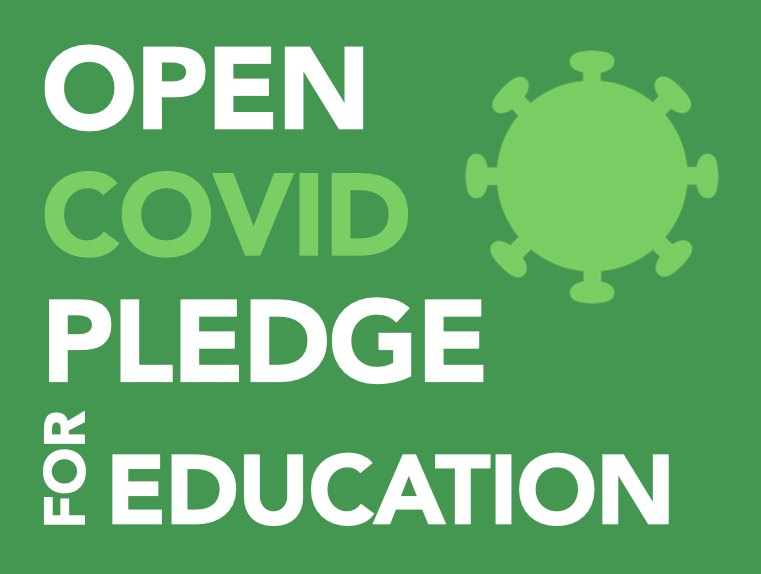
What is the Open COVID Pledge for Education?
In August, OER Africa introduced the Open COVID Pledge for Education, which was launched at the OER20 Conference earlier that month. OER Africa is proud to be a founding signatory of this Pledge, which encourages individuals and organisations to make their intellectual property available through open licensing arrangements to support educators, learners and decision-makers and assist educational organisations.
As the COVID-19 pandemic continues to spread, millions of learners and educational institutions globally have had to place greater reliance on digital communication and media in teaching and learning. The long-term effects of such shifts have yet to be seen, but there is no doubt that those most negatively affected will be learners in under-resourced environments, where access to high-quality educational resources, ICT, and learner support is often limited.
Developed by the Open COVID Coalition and hosted by the Association for Learning Technology (ALT), the Open COVID Pledge for Education responds to this context by drawing from principles highlighted in the UNESCO Recommendation on OER (2019) and building on the Open Education values outlined in the Cape Town Declaration. It has been signed by representatives of many global Open Education Open Education bodies and professional organisations, universities, and individual researchers.
The Pledge asks that signatories commit to sharing Open Educational Resources (OER) for educators to support teaching and learning over the course of the pandemic. It also asks that signatories share practice and policy lessons, such as how individuals or organisations are responding to COVID-19 and what they are learning. In addition, the Pledge encourages signatories to share the following:
- Open data, e.g. from surveys;
- Open access research;
- Unpublished research, organisational research, action research; and
- Open source applications to support open education.
What has happened since the Pledge was launched?
Since its launch, two planning meetings were held online in September and October. These meetings produced an email discussion list, the Twitter account and hashtag, and an informative slide deck and logo. The team also conducted an open webinar in collaboration with the Open Education Special Interest Group to promote the Pledge.
UK-based members of the Open COVID Pledge for Education are currently developing two organisational case studies – one on University College London and the other on the University of Edinburgh – to showcase how they have released OER for educators as well as policy and research purposes under the Pledge. A keynote panel will be held on 15 December 2020 as part of the ALT winter conference, where the two case studies will be launched.
To date, there are 60 organisational signatories and 121 individual signatories and the project team welcomes new signatories.
How can I get involved?
The Open COVID Pledge ultimately aims to build a fairer and more resilient education system. It has been promoted using the @Covid_education Twitter account and #OpenCovid4Ed hashtag; through blog posts on the ALT blog; and on a public email list. You can become involved in the Pledge in various ways:
- Sign the pledge as an individual or organisation
- Upload your logo
- Blog about it, and share using #OpenCovid4Ed
- Join the discussion list by emailing OPEN-COVID-ED
 jiscmail [dot] ac [dot] uk (OPEN-COVID-ED[at]jiscmail[dot]ac[dot]uk)
jiscmail [dot] ac [dot] uk (OPEN-COVID-ED[at]jiscmail[dot]ac[dot]uk) - Spread the word with the Pledge’s Twitter handle and hashtag
- Download the logo here to add to your own websites
For more articles by OER Africa, click on the links below.
- How can governments and institutions operationalize the OER Recommendation? (19 November 2020)
- How can you use MOOCs in your teaching? (21 October 2020)
- Online assessment: How do we know if students are learning? (18 September 2020)
- UNESCO’s OER Recommendation Dynamic Coalition Consultations: The way forward (26 August 2020)
- The Open COVID Pledge for Education (12 August 2020)
- How can OpenCourseWare help you to improve your courses?(16 July 2020)
- Evaluating Open Content (2 July 2020)
- Adapting Open Content (25 June 2020)
- Sharing Africa’s knowledge through open data (18 June 2020)
- Sharing Africa’s knowledge through openly licensed publishing (11 June 2020)
- Podcast: OER and their Relevance to the COVID-19 pandemic (5 June 2020)
- Sharing Africa’s knowledge through open African research repositories (29 May 2020)
- Emergency Remote Teaching Webinar Series – All resources available (18 May 2020)
- OER Repositories in Africa (8 May 2020)
- How to Find Open Content (30 April 2020)
- Online (and offline) reading resources for children (23 April 2020)
- Showcasing OER Platforms: OER Africa (15 April 2020)
- Understanding OER in a Context that Necessitates Remote Learning (9 April 2020)
- OER Africa COVID-19 Statement (3 April 2020)
